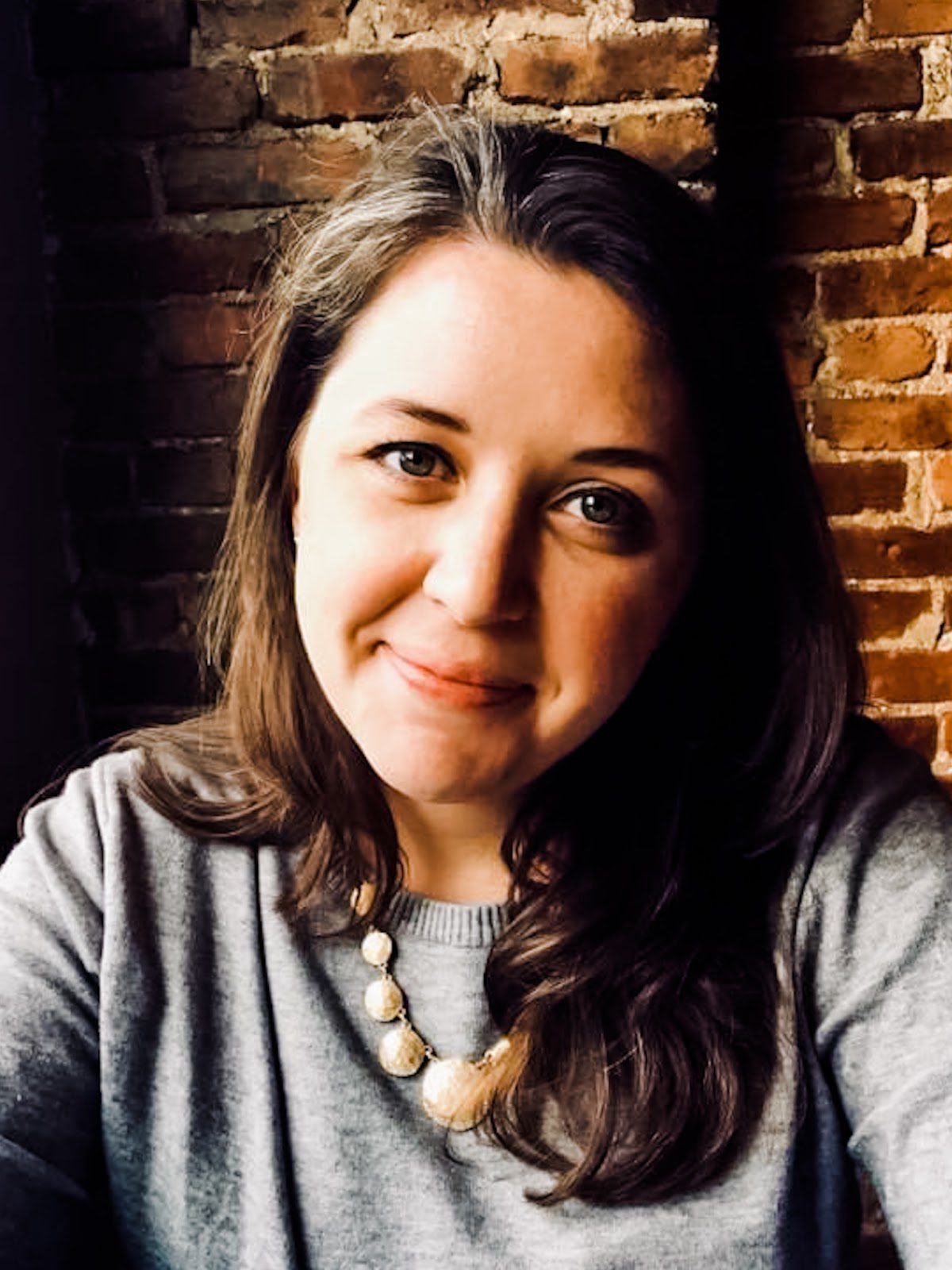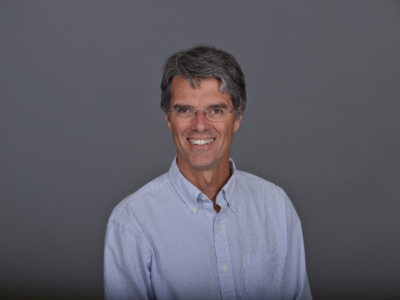Author, podcaster, radio producer, mother of three, Danielle Hitchen started Catechesis Books to publish Biblical and theological resources inspired by her own little ones. She’s just released her seventh book in the Baby Believer Primer series and she was so kind to take a moment from their first week back to (home)school to talk with us. Here’s our interview, edited for concision.

How did you come to start Catechesis Books?
When my oldest was about 18 months old, somebody asked me what I was doing for her spiritual development, [I said], ‘keeping her alive!’ I had this series of books at the time called BabyLit, they take classic lit and they reformat them into primer style books. I loved reading those so I thought, somebody should do that with theology and kind of laughed it off.
Then I thought, you know that’s really a good idea, maybe somebody’s done that — I should go find those books. I looked and looked and I couldn’t find what I was looking for so I thought why don’t I write those books? So I sat down one weekend and pounded out a couple of manuscripts just to see if the idea was viable and I started looking around for an illustrator trying to figure out if traditional publishing was even an option for me. I ultimately decided no. I didn’t really have a platform at that point so I decided to create a Kickstarter project to fund my first book and that was the beginning of Catechesis Books.
After the Kickstarter we signed with Harvest House Publishers and worked with them to rerelease the first book and then publish our last six books. My seventh book [We Believe: An Alphabet Primer] just came out yesterday!

Congratulations! How does it feel to release your seventh book?
In a lot of ways, it feels like the culmination of our work. This book is bigger and longer than all the others. It takes the Apostles and the Nicene Creed along with The Scripture and one quote from a hymn, and it tries to succinctly summarize the core doctrine of the Christian faith. Obviously in an ABC book you can’t cover everything. There are certain things that we just couldn’t fit into the book based on word count, and the fact that we were writing for an audience between the ages of zero to four years old, but we tried to get as much of the creeds in there as possible.
Do you have a background in theology?
Not really. I went to a Christian university, and it requires a Bible minor for all of its students. I am passionate about good theology and I’ve seen the ways that theology has helped strengthen and deepen my own faith. I like to know the reasons why we believe things and I think that good theology is one thing that we can sometimes lack in the church. Emotion should be a huge part of our relationship with God, but I also think we need to have an answer for our faith, and theology is how we make an answer for our faith. So I think kids need to know it.
Any particular theologians you would recommend?
I have been listening to sermons by a man named Darrell Johnson, he taught at Regent University. I really love his stuff. I read my first Eugene Peterson book within the last year, which I know is crazy. I feel like everybody has read some Eugene Peterson at this point in their life. And I’ve read a good amount of the Church Fathers and Martin Luther’s works as well, which I came back to in the pandemic. Luther has an essay written in the 1500s called “Should a Christian Flee from a Deadly Plague?” and it was certainly helpful at the beginning of this season to reread the things he says about Christians’ duty in a time of pandemic. I love that there are writers who wrote hundreds of years ago and their stuff is still relevant today.
I can hear that coming through in your podcast series Sacred Season.
Yes. It’s about mothering through the seasons of a church calendar, but in a lot of ways, it’s just about living through the seasons. My co-host and I are both moms and so we come at a lot of life from the lens of ‘what does it look like to be a good mom or a good wife in this season?’
One spiritual discipline that I have really enjoyed since becoming Anglican over a decade ago is observing the church calendar based around the life of Christ. It starts in Advent, as we anticipate Christ’s coming, and then moves all the way through to the Ascension. Then there’s a season called Ordinary Time. And I love thinking about my calendar and orienting my time around the life of Christ rather than the secular calendar, or the school calendar, or the world calendar. I think it’s a useful practice to think about the season in the life of Christ that we’re in, and how that affects us.
I like the idea of Ordinary Time, tell me more.
Ordinary time is the season after the Ascension, but before we get back to Advent, that actually makes up the bulk of the church year so it lasts from, depending on when Easter is, usually late May all the way up until around the beginning of December. And it’s also called the time of the Holy Spirit, because it’s the time after Christ has ascended when the Holy Spirit has come after Pentecost. The color for that season is green, the color of growth and green is actually the color of the Holy Spirit as well in the traditional liturgical orientation of things. And, you know, so much of our life is made up of ordinary time, it’s not made up of big events, it’s not made up of big holidays, it’s not culminating in anything in particular, it’s just sort of daily living. And I love that the church recognizes the majority of our life is daily living, and that is where the most growth happens.
That’s beautiful.
Yes. I love Ruth Chou Simons quote, ‘You don’t have to be blooming to be growing.’ I feel like that really captures what Ordinary Time is about. Ordinary Time can sometimes feel thorny and it can sometimes feel wintry, and it can sometimes feel like a great big blossom. But it is a time where you look to be growing in your daily life, and look at the ways that God is meeting you and that the Holy Spirit is guiding you throughout the daily rhythms of your life, just in the regular old mothering and cooking dinner and going to work, commuting on your way home, being a good neighbor. All those things are places where God meets you.
In the daily rhythms, what’s it like to navigate the challenges of running a small business, writing, making space for creative flow, and being a mother?
I have three kids. I actually just started homeschooling my kids this week, this is day three. I have a six year old, a four year old, and then a nearly 21 month old. And we just feel like life is very full right now, especially with bookwork and then I also work as a producer for a radio show. So the podcast has been on hold for a bit as my co-host and I have worked to manage life in a pandemic but we’re hoping to get back to that as well. It’s a good thing God meets us in the ordinary work of our daily lives because there’s definitely a lot of ordinary work happening right now.
Do you have a favorite season?
I love the season of Advent and the fact that it’s supposed to be a period of quiet and waiting and preparation and darkness. We like lighting the Advent candle in our home and adding light each week as we prepare for the light of Christ to come on Christmas. I love that pre-Christmas season as well where you’re doing a lot of baking and you are building anticipation for Christmas Day, but I also love that the season of Christmas follows Christmas Day. There are twelve days of Christmas from the 25th of December, all the way to the sixth of January, and we try to make that as celebratory as we can with our kids so that they remember that Christmas is its own season. But honestly, my very favorite is Easter. Easter is just such a beautiful time of new life. I love that there are blossoms on the trees and things are starting to get green again and just the metaphor of the seasons, that coincide with the resurrection.
You posted on Instagram that you are an INFJ and an Enneagram 2. Tell me what that means for you.
So the INFJ — I am definitely a deeply intuitive person and I get gut feelings about things. I was so vindicated a few years ago to read a study that said there are loads of neurons in your gut. This explains gut feeling so well! Growing up, people would talk about the faith-fact-feeling train and how your faith needs to be leading the train and your feelings need to be on the back end. For so much my life I felt like that was not really the way that I operated. My gut has intuitions about things that often end up being correct. Faith is very important. I would like for my gut to coincide with my faith, but I don’t think that feelings need to be the back end of anything. I think your feelings indicate really deep and profound things about what is going on in your life and you need to attend to them. So when I got my INFJ results, and I read about the neurons, I was like ‘oh this explains so much about me.’ I think there’s a lot to be said for good intuition. And I’m also certainly an introvert. I like to be quiet. I like to have alone time. In a house full of young children that is a little bit hard to come by.
In terms of the Enneagram Two, I’m an Enneagram Two with a Three-Wing, which is called The Hostess. And that made a ton of sense to me as well. I am certainly a helper. So much of being a mom and a wife is being a helper, and I love fulfilling those roles. I love fulfilling those roles in my church. And for my family. I love hosting parties.
What is your one word?
I don’t know that I have just one word. Rest? Maybe as an aspirational word, certainly.
What makes you feel alive? Where do you find wonder?
I love being at the beach. I love the wide-open space. I love the noise of the ocean. And in a life that feels otherwise very crowded, it’s nice to see so much space before me, and to be at the edge of the world, or what feels like the world.
What is one question you wish you had the answer to?
Oh goodness, there are so many. Really like everything. I would love to know ultimately, what we’re called to do here. What would it look like, ideally, for us to bring God’s kingdom to bear in this light, because there’s so many ways to think about that in terms of how we interact with our immediate neighbors versus our colleagues versus our church family versus our kids, friends, parents at school…. so much of life is muddling through how to love these people well. I’d love to have a very clear assignment. I’m good with assignments. And I think it’s clear enough that God gave me my kids and my husband and I’ll move outward from there.
What is your favorite thing about being an author?
I love hearing from people who are reading the books and knowing that the books are impacting their lives. When we started this project we hoped that somebody would buy it, and then we hoped that maybe we would break even, and that this would just be a fun book that I might have for my own kids. It’s been so rich and wonderful to hear the stories from people about what they themselves are learning and about what their kids are learning. I’ve been shocked by the number of adults who have told me that their own faith has been impacted or renewed by reading the books with their kids and that’s just such an honor. I don’t know why I get to do this project, but I am so grateful that God has allowed me to steward it.
You’ve done a great job of weaving a substantial amount of information into a baby book. With the Baby Believer series, were you intentionally building a sort of curriculum that could be used throughout various stages of childhood?
Yes, so the books are written to be read on several levels. One is just a very basic flip through look at the pictures, or flip through and read the headings on the pages and start to talk about the concepts. And then, at the highest level for the oldest kids, you start to read and memorize the Scripture. The Scripture, depending on the book, is more or less complex. Psalms of Praise seems to be picked up by toddlers pretty easily. Those are fairly short phrases from the Psalms, and they’re linked to actions which small children are more easily able to keep in their heads.
So, yes, I have heard from a number of parents that their older kids get a lot out of the books because of the amount of Scripture that is in them, but the thing about kids is that they are little sponges and these books set a foundation, on the level of rote memorization. They’re learning that Jesus has two natures, he’s fully God and fully man and that there are three persons of the Trinity, these are things to hang your hat on later in life. They are things to stick in your brain and then to come back to and to expand on more fully as your kids get older.
And that’s where I think the real benefit of the books is: that you’re giving your children a theological vocabulary to start with, and then you can come back and explain those concepts in more depth later as they get older and have more capacity to learn. I mean obviously a three year old is not going to understand The Trinity, most grown ups don’t, but just to have them know that God is three in one, the Father, Son and Holy Spirit, is such an important thing to start kids with.
Did you have anything like this when you were a child?
I did not. I didn’t even start going to church until I was five.
Do you think you will ever write books for adults?
I don’t know. I am an avid reader of fiction, and I feel like I would love to try my hand at a novel, but there is no way I have time for that anytime in the near future. So who knows, in terms of a nonfiction book, that’s hard to say. I’m not much of a nonfiction reader. I don’t know that I would want to write something that I wouldn’t necessarily want to pick up and read myself.
I just think you have a lot of insight to share.
We’ll see. If somebody asked me to write something in particular and I felt really called, I might do it but for now I’m really happy doing what I’m doing.





 Copyright
2024
Root and Vine
Copyright
2024
Root and Vine